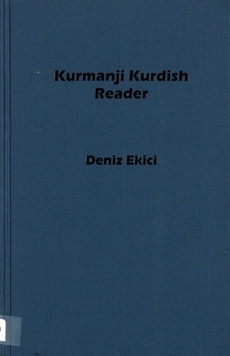|
ACKNOWLEDGMENTS
This Kurmanji Reader has been a few years in the making. Although it is not a grammar book, it has an extensive grammar section in addition to its thirty-one selections and vocabularies.
The ideas expressed in the selections are those of the authors in their respective articles and they are not intended to represent the position of the author of this book.
During the writing process, many people offered me valuable help with this project. For his assistance in choosing appropriate articles and his continuous support, I am grateful to Mr. Thomas Creamer. I owe a great deal to Ms. Laura Boulden for her thorough review of this book and invaluable corrections and suggestions to improve the quality of this book. I would like to acknowledge Mr. Jack Jones, Ms. Erin Gyomber, and Ms. Carole Breakstone for their expert editing work. I would also like to thank Mr. Aung Kyaw Oo for formatting the book, and Mr. Mark Jeon for his help in recording the articles.
1 am indebted to Mr. Baran Rizgar for the long, valuable conversations we had over the phone and the Internet about Kurmanji grammar. I am also indebted to the editors of Kurdish newspapers, magazines, and web sites who let me use their news and articles; I would like to thank Mr. Şefik Beyaz, the former president of the Istanbul Kurdish Institute; Mr. Rojhat Amedi of Peyama Kurd; Mr. Haydar Diljen of dibistanakurdi.com; Mr. Arif Zêrevan of nefel.com and kerkuk-kurdistan.com; Mr. Sîrwan Hecî Berko of amude.net; Mr. Rêbiwar Pîremêrd of rojev.com; Mr. Tayîp Temel of Azadiya Welat; and Mr. Ali Riza Vural of Doz Publishing House. I must also thank my students at the lnlingua Language Center for all their help.
Most of all, 1 am eternally grateful to Dr. Michael L. Chyet, who reviewed numerous drafts of this book and each time provided me with invaluable comments, suggestions, improvements, and corrections that I have incorporated into my work. It has been a great privilege and source of confidence to have Michael’s support in this project.
A special thanks to my wife Dawin for her encouragement and constant support during this project.
Introduction
This Kurdish newspaper reader is the latest addition to a small corpus of resources available to advanced student of Kurdish.
The articles that Mr. Ekici has chosen for this Kurmanji newspaper reader are timely, and the topics reflected in them give a good idea of how varied Kurdish life is today. The additional explanatory notes which have been provided — some about cultural matters, others about grammatical points -add to the book's value. The world of Kurdish studies welcomes a work such as this, showing things as they are in the first decade of the 21st Century. A great deal of effort has been put into this impressive undertaking: the newness of the material is truly refreshing.
With the exception of the correction of obvious typographical errors, the articles have been taken word for word as they appeared in their original format: grammatical inaccuracies have not been altered, although they are pointed out and discussed in the notes. This means that the spelling of certain words may vary from one article to the next, an inevitable situation in a language as rich in multiformity and regional variation as Kurmanji Kurdish. The vocabulary also manifests variability', as some writers borrow liberally from Sorani, while others refrain from this practice.
The articles in this volume have been limited to publications and web sites that use the Latin orthography for Kurdish, although Kurmanji is also written in the Arabic script in Iraq and Iran (but not in Syria, interestingly enough, where it is written in the Latin script), and at least until recently in a modified Cyrillic script in the lands of the former Soviet Union (Armenia, Azerbaijan, Georgia, Kazakhstan).
The very first Kurdish reader was Alexandre Jaba's Recueil de notices et récits kourdes servant à la connaissance de la langue, de la littérature et des tribus du Kourdistan, réunis et traduits en français published in St. Petersburg, Russia in 1860. It was in Kurmanji, the northern dialect of Kurdish, and consisted of 40 texts in Arabic script, accompanied by French translations. (A reprint edition is available through APA-Philo Press, Amsterdam.) Not until 1959 did the first modern Kurdish reader for foreigners appear, in the guise of Stig Wikander’s Recueil de textes kourmandji, which was published in Uppsala. It contained only the texts themselves, without accompanying translations, vocabularies, or explanatory notes. This was reprinted in Istanbul in 1992 under the Kurdish title Berhevoka Kurdi, without any editorial changes whatsoever. In 1968, Joyce Blau published a small volume entitled Kurdish Kurmandji Modern Texts:
Introduction, Selection and Glossary, which includes a glossary. Her …
| 